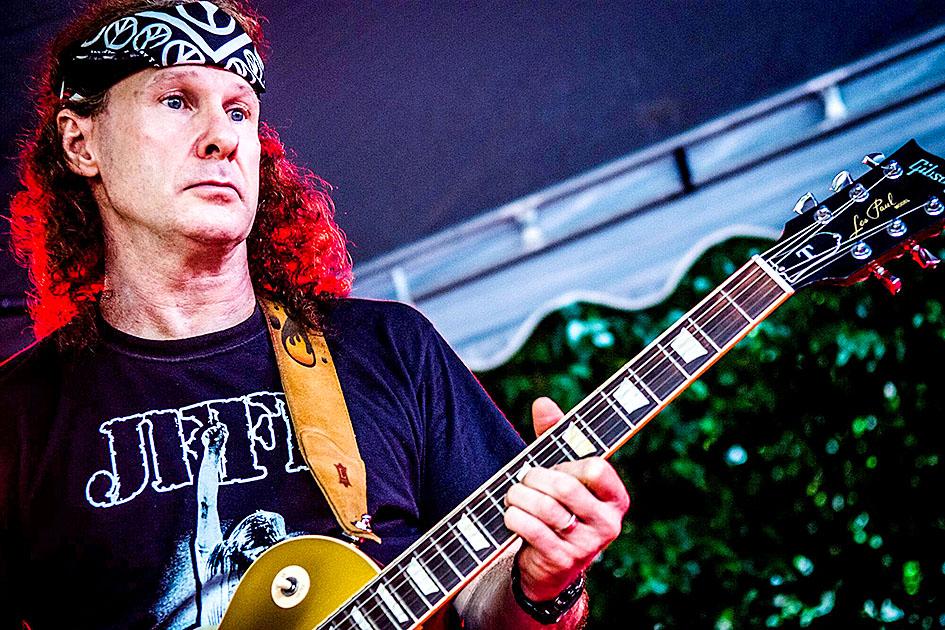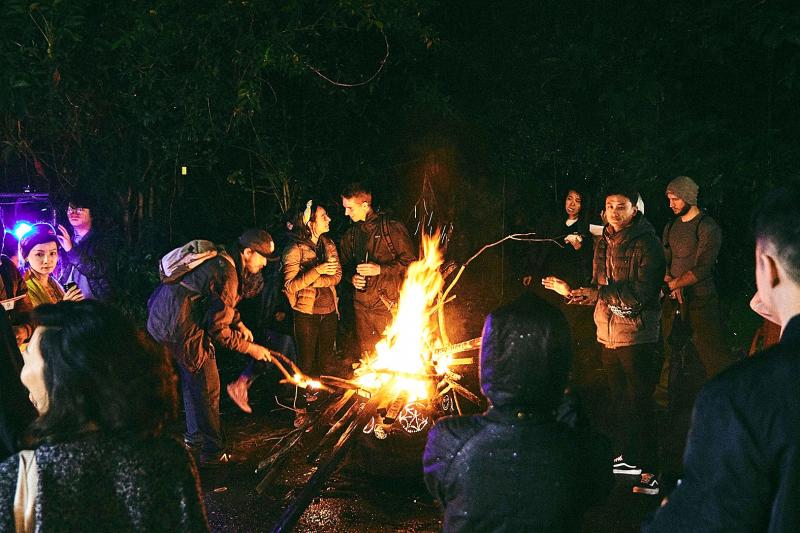It was a musician’s worst nightmare: Mike McLaughlin blew his rig hours before pop queen A-mei’s (張惠妹) took the stage in Hong Kong. Having only previously played in Taiwan and the US, he had no idea that the voltage standard was different.
“It was my first time ever playing with A-mei. I’m pretty psyched and I really wanted to do a good job,” the session guitarist says. “Then I plug the rack in and blow it up the day of the show. I was like, ‘Oh my god, what am I going to do?’”
Fortunately, only the fuse was damaged and it was quickly replaced. McLaughlin went on to tour with an impressive list of Taiwan’s pop royalty over the next two decades.

Photo courtesy of Tiger Mountain Ramble
The months leading up to Lunar New Year is usually busy season for McLaughlin. But due to COVID-19, there’s been few performances for him besides last month’s six-show concert in Kaohsiung with pop diva Jolin Tsai (蔡依林), which he says is the most elaborate production he has ever been part of. They kicked off the tour in Taipei in December last year and planned to head to China for over 40 shows, but that all fell apart as the virus hit.
The lull has given McLaughlin time to work on his rock and blues-oriented material and participate in local projects ranging from his one-man show to a “Taiwan G3” supergroup with fellow guitar virtuosos Fabio Moreira and Again (蔡科俊, concert director for Jay Chou, 周杰倫). While McLaughlin is no stranger to Taiwanese festivals, tomorrow’s Tiger Mountain Ramble will be his first time rocking out to his own songs with new outfit Soul Connection.
The band will be playing McLaughlin’s originals as well as some bluesy covers during the all-day jamboree, which features 16 bands and two DJs on three stages in a mountain venue just a short walk or 10-minute taxi ride from Xiangshan and Houshanpi MRT stations. The lineup ranges from rock to blues to gypsy jazz, Afro-Carribean beats and Latin grooves, and there will be a campfire and plenty of food and drink options.

Photo courtesy of Tiger Mountain Ramble
Decked out rocker style with a skull ring and multiple hoop earrings under a curly mane of hair, McLaughlin arrives at our interview this week looking like he’s ready to jump on stage and start shredding his heart out. The St Louis native has mainly been working with Taiwan’s household pop names since he relocated here in 2000, but his soul is still rooted in the ‘70s and ‘80s rock ‘n’ roll he grew up on. Antipop, the title of his first solo album, says it all.
The freedom that McLaughlin is allowed to express himself varies from artist to artist. Music director for Tsai’s concerts, Starr Chen (陳星翰), is among those who let him cut loose.
“He’s very open and he’s like, ‘Yeah man, Mike, make it rock.’ He gives me the freedom to add my own little sauce,” McLaughlin says. “Some people are like, ‘Stick to the program and what’s written on the chart,’ and you have to be flexible — especially if you’re a hired gun, so to speak. You have to give them what they want.”

Photo courtesy of Tiger Mountain Ramble
McLaughlin recalls the explosive vocalist Shin (信) pushing him when arranging some of his old tunes for a show, which seemed to alarm the record label executives a bit.
“He was really into [German metal band] Rammstein at that time and he was like, ‘Make me sound like that,’” McLaughlin quips.
Rock duo Power Station (動力火車) was also fun to work with because they still did everything live for their concerts instead of having everything charted out and controlled with in-ear monitors and click tracks.
“That was one of the closest things to a live rock ‘n’ roll band that I was used to in the early days,” McLaughlin says.
McLaughlin was already making his mark in Los Angeles during the 1990s — one of the highlights was touring with Kiss founding drummer Peter Criss — when he landed a gig to lay down some tracks for a Taiwanese singer. He knew nothing about Taiwan then, but he got on well with recording engineer Terrance Sheng (盛子貞), who invited him to collaborate on other projects.
Sheng was well-connected with Taiwan’s music industry as bass player for influential rock band Oriental Express (東方快車), and he headed home to promote a demo with a female singer he wrote and recorded with McLaughlin. One of the people who heard the tape was veteran entertainer Chyi Chin (齊秦), who enjoyed the production so much that he recruited Sheng and McLaughlin to work for him in Taiwan. One connection led to another, and soon McLaughlin was in demand by the nation’s top acts.
Despite his glitzy resume, McLaughlin still relishes the chance to play at more intimate venues such as last Friday’s performance at Craft House, a tiny beer and pizza joint in Taipei.
“Those are fun in a different way because I get the freedom to do whatever I want,” McLaughlin says. “I get to stretch things out and try new things. Both worlds are great and I enjoy them both and all the stuff in between.”
Just like the Tiger Mountain Ramble.

One of the biggest sore spots in Taiwan’s historical friendship with the US came in 1979 when US president Jimmy Carter broke off formal diplomatic relations with Taiwan’s Republic of China (ROC) government so that the US could establish relations with the People’s Republic of China (PRC). Taiwan’s derecognition came purely at China’s insistence, and the US took the deal. Retired American diplomat John Tkacik, who for almost decade surrounding that schism, from 1974 to 1982, worked in embassies in Taipei and Beijing and at the Taiwan Desk in Washington DC, recently argued in the Taipei Times that “President Carter’s derecognition

This year will go down in the history books. Taiwan faces enormous turmoil and uncertainty in the coming months. Which political parties are in a good position to handle big changes? All of the main parties are beset with challenges. Taking stock, this column examined the Taiwan People’s Party (TPP) (“Huang Kuo-chang’s choking the life out of the TPP,” May 28, page 12), the Democratic Progressive Party (DPP) (“Challenges amid choppy waters for the DPP,” June 14, page 12) and the Chinese Nationalist Party (KMT) (“KMT struggles to seize opportunities as ‘interesting times’ loom,” June 20, page 11). Times like these can

JUNE 30 to JULY 6 After being routed by the Japanese in the bloody battle of Baguashan (八卦山), Hsu Hsiang (徐驤) and a handful of surviving Hakka fighters sped toward Tainan. There, he would meet with Liu Yung-fu (劉永福), leader of the Black Flag Army who had assumed control of the resisting Republic of Formosa after its president and vice-president fled to China. Hsu, who had been fighting non-stop for over two months from Taoyuan to Changhua, was reportedly injured and exhausted. As the story goes, Liu advised that Hsu take shelter in China to recover and regroup, but Hsu steadfastly

You can tell a lot about a generation from the contents of their cool box: nowadays the barbecue ice bucket is likely to be filled with hard seltzers, non-alcoholic beers and fluorescent BuzzBallz — a particular favorite among Gen Z. Two decades ago, it was WKD, Bacardi Breezers and the odd Smirnoff Ice bobbing in a puddle of melted ice. And while nostalgia may have brought back some alcopops, the new wave of ready-to-drink (RTD) options look and taste noticeably different. It is not just the drinks that have changed, but drinking habits too, driven in part by more health-conscious consumers and